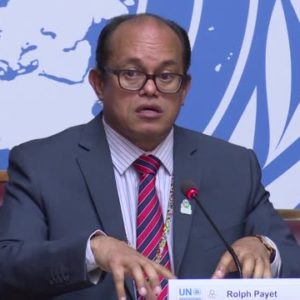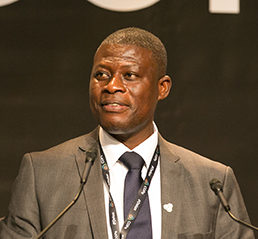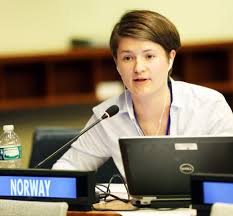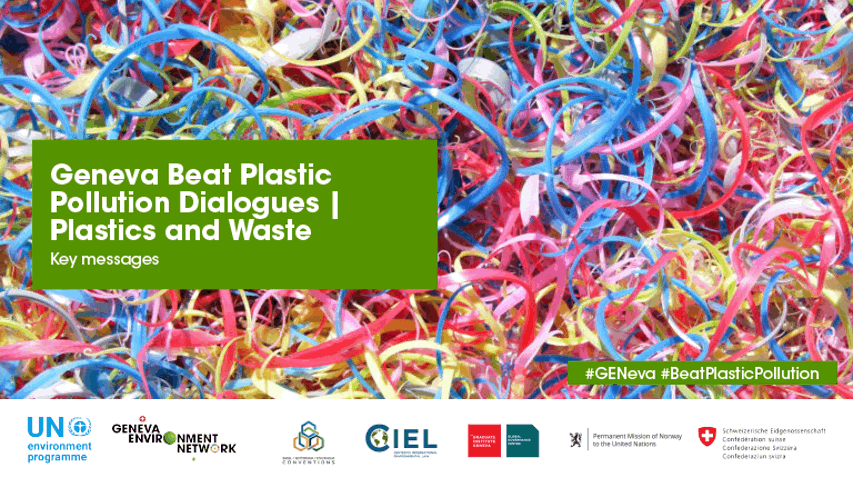Event Virtual
Geneva Beat Plastic Pollution Dialogues | Plastics and Waste

The Geneva Beat Plastic Pollution Dialogues aim to facilitate further engagement and discussion among the stakeholders in International Geneva and beyond. In addition, they intend to address the plastic crisis and support coordinated approaches that can lead to more efficient decision making.
About the Dialogues
The world is facing a plastic crisis, the status quo is not an option. Plastic pollution is a serious issue of global concern which requires an urgent and international response involving all relevant actors at different levels. Many initiatives, projects and governance responses and options have been developed to tackle this major environmental problem, but we are still unable to cope with the amount of plastic we generate. In addition, there is a lack of coordination which can better lead to a more effective and efficient response.
Various actors in Geneva are engaged in rethinking the way we manufacture, use, trade and manage plastics. The Geneva Beat Plastic Pollution Dialogues aim at outreaching and creating synergies among these actors, highlighting efforts made by intergovernmental organizations and governments, businesses, the scientific community, civil society and individuals in the hope of informing and creating stronger synergies and coordinated actions. The dialogues will also look at what the different stakeholders have achieved at all levels, present the latest research and governance options.
In addition, although the dialogues target stakeholders from all continents, they primarily aim to encourage increased engagement of the Geneva community in the run-up to various global environmental negotiations, such as:
- UNEA-5 (1st and 2nd sessions) in February 2021 and February 2022
- BRS COPs in July 2021
- SAICM ICCM5 in 2022
This first session of dialogues will end in February 2021 to build momentum towards the first session of UNEA-5. It will aim to facilitate further engagement and discussions among the International Geneva stakeholders and actors across the regions and support coordinated approaches that can lead to more efficient global decision making. It will also intend to provide a platform to further carry the discussion from the recently conclude Ad Hoc Open-Ended Expert Group (AHEG) on Marine Litter and Microplastics towards UNEA-5 part 2 in 2022.
The Plastics and Waste session is the first dialogue to be organized leading to and making recommendations towards the High-Level Dialogue on Plastic Governance Dialogue on 11 March 2021.
The dialogues are organized in collaboration with the Basel, Rotterdam and Stockholm Conventions Secretariat, the Center for International Environmental Law, the Global Governance Centre at the Graduate Institute, Norway, and Switzerland.
Plastics and Waste Session
Consumption of plastics is increasing and, as a result, more and more plastic waste is being created. Today, plastic waste and marine plastic litter are global environmental problems addressed by the United Nations Environment Programme (UNEP) and the international community.
A number of initiatives and activities exist aiming at addressing the plastic waste problem and eliminating plastic litter entering the oceans. There is also a growing recognition for new governance models to be explored to address these trends.
A Global Partnership on Marine Litter was launched at the Rio+20 Conference in 2012 and various resolutions have been adopted at the United Nations Environment Assemblies on the challenges posed by marine plastic debris and microplastics, asking to address such materials at source. Governments, businesses and civil society organizations have been encouraged to make bold commitments to beat plastic pollution. The Ad Hoc Open-Ended Expert Group on marine litter and microplastics was established in response to the resolution UNEP/EA.3/Res.7, on marine litter and microplastics, adopted by the UN Environment Assembly at its third session in December 2017. It looks at international governance options for tackling plastic waste.
The resolution “Addressing single-use plastic products pollution” was ratified by members states at the 4th Session of the UN Environment Assembly, in March 2019. Member states are called upon to take measures to curtail and limit the ecological consequences of plastic waste. Various countries, regions and cities have imposed rules or bans on certain single-use plastics.
In May 2019, the 187 parties to the Basel Convention, the a treaty that controls the movement of hazardous waste from one country to another, took a major step forward in curbing the plastic waste crisis by adopting amendments, proposed by Norway, requiring exporters to obtain the consent of receiving countries before shipping most contaminated, mixed, or unrecyclable plastic waste. Countries in the Global South can use this tool to stop the dumping of unwanted plastic waste into their country. These will be effective as of 1 January 2021.
Leading experts invited to talk at this session looked at what the different stakeholders have achieved at all levels, and governance options being proposed to reduce or eliminate plastic waste, as well as the next steps ahead and propositions to address the main challenges identified.
Next Sessions
- Plastics and Climate, Air Pollution | 10 December 2020
- Plastics and Human Rights | 14 January 2021
- Plastics and Health | 21 January 2021
- Plastics and Standards | 28 January 2021
- Plastics and Trade | 4 February 2021
- Plastics in the Life Cycle/SCP | 11 February 2021
- High-Level Dialogue on Plastic Governance | 11 March 2021
Speakers

Bruno POZZI
Europe Director, United Nations Environment Programme

Rolph PAYET
Executive Secretary, Basel, Rotterdam and Stockholm Conventions

Leticia CARVALHO
Head of the Marine and Fresh Water Branch, Ecosystem Division, United Nations Environment Programme

Sam ADU-KUMI
Director, Chemicals Control and Management Centre, Ghana

Felix WERTLI
Head of Global Affairs Section, Federal Office for the Environment, Switzerland

Ingeborg MORK-KNUTSEN
Senior Adviser, Ministry of Climate and Environment, Norway

David AZOULAY
Director of the Environmental Health program, Center for International Environmental Law (CIEL)
Video
In addition to the live WebEx and Facebook transmissions, the video is available on this webpage.
Summary
Welcome and Introduction
Opening Remarks | Bruno POZZI, UNEP
The world is facing a plastic crisis and we know that status-quo can’t be an option. This fight against plastic pollution has become even more visible these days with the COVID-19 pandemic. We use disposable masks, gloves, protective equipment and as we fight the pandemic, we produce even more plastics, so we need to address this so that the pollution doesn’t increase even more.
There are many initiatives, projects, government responses and options that have been developed to tackle this important environmental problem. But the coordination is key in making it a good solution and we can have the lead to a more effective and efficient response to the plastic pollution.
In Geneva we have a number of actors that are engaged in rethinking the way we manufacture, use, trade and manage plastic. This is why also we have got this Geneva Beat Plastic Pollution Dialogues. It will aim to facilitate further engagement, discussion among stakeholders in Geneva and actors across the region and across the world so that we can have a coordinated approach that can lead to more efficient decision-making process.
There is a momentum, there is a time for action and we need to seize it.
Setting the Scene
Policy Context for the Dialogues | Felix WERTLI, Switzerland
The issue of marine plastic pollution is an environmental problem of global dimension and it requires an international response involving all related actors at all different levels. A key milestone was at UNEA-1 in 2014 where member states recognizes the global environmental threat of marine plastic pollution. Now, six years later, we have increased our knowledge on both governance and technical research related work.
UNEA has negotiated further resolution and now in between we have agreed on certain decision texts on this matter. Switzerland is looking at this issue and at certain key questions. The main one is if the current setting is strong enough to tackle this huge environmental issue. We can look at it from a national perspective and here Switzerland has some impressive numbers.
Around 14,000 tons of plastic entry the soil of Switzerland every year, that means 125 kg of plastic per person. Switzerland has the chance to have a well working waste management system, and this allows that every year, only 20 tons out of the 14,000 tons end-up in the oceans. That means that Switzerland contributes to 0.0002% of the world total pollution of plastic in the ocean.
Recently, Switzerland launched a report on the State of the Environment of Switzerland. This report reminded that about 75% of all material consumption in Switzerland is caused abroad. We live in a globalized collective world and Switzerland knows that national actions are not sufficient in this case also because Switzerland produces a lot abroad, exports and imports, so it causes a lot of consumption of microplastic litter abroad. Another example of this global dimension is how plastic ends in the ocean. When plastic goes to rivers, one day it will end in the oceans.
If a country takes measures but its neighboring country might not be in a position to do so, we still are impacted. There is a need to see it from a national perspective and from a global perspective because it is a global issue. Switzerland has seen a number of voluntary and initiative platforms emerging.
However, it is a key question for Switzerland to check if this is sufficiently coordinated and robust enough.
Looking at the figures of plastic use, there is a doubt that the current regime is enough, more has to be done. A robust system has to address the entire lifecycle. We have to shift from this past idea that the main concern and task is to manage the waste. We have to come to a circular economy that thinks about the reduction of use, improve designs of substitutes and so on. We have to do some further work on how can we address the lifecycle, what is a robust regime to address it? What are the voluntary measures that we can take? What are the more legally binding measures that we can take, what are the base steps?
These dialogues will contribute to discussion because important milestones are coming up in the near future. There is the BRS COP is July 2021, the SAICM ICCM5 in 2022 and UNEA-5 in February 2021. Those are moments where we can work to tackle this issue, where we can design, enhance and strengthen our systems.
Plastics Waste a Global Crisis | Ingeborg MORK-KNUTSEN, Norway
Preventing pollution from plastic litter is a key priority for the Norway Government. Plastic is indeed a great feature of our modern society. It has a number of great benefits that we depend on in our daily lives notably, it is designed to last for a long time, and that is also what makes plastic waste a huge problem when it ends up in our environment and in our oceans. This is a truly global issue and no country can solve this issue alone.
Norway has supported a stronger global commitment to deal with this issue since the first UNEA back in 2014 and has proposed the amendment to the only one existing legally binding agreement, the Basel Convention, for stronger control of global trade and plastic waste back in 2019. Norway believes that a new global agreement that addresses the issue of plastic litter from both sea-based and land-based sources would be the most effective global solution to deal with this issue.
Today, we know that the global consumption of plastics is expected to grow in the years to come and as a result more and more plastic waste will be created. 2 billion people lack of access to basic waste management today, so we need to get smarter about the way we produce, the way we use and dispose of our plastic. We need to put in place measures across the all value chain of plastic so that we can improve the design of plastic products to make them stay longer in the plastic value chain and as such, minimize the production of plastic waste. We also need to increase the use of secondary plastic material.
A number of initiatives and activities exist today aiming at addressing the issue of plastic waste and eliminating plastic litter entering in the ocean. Over the past few years, actions have been taken in a number of foras and instruments but more coordination is needed to make sure that we are actually meeting our target.
Currently there is no global agreement designed to address this issue across the all lifecycle of plastic and in many ways the current plastic waste crisis is due to a lack of good governance. Norway therefore believes that we need today to address this issue like we have done with other global environment challenges, putting in place a global agreement like we have for biodiversity, climate change or hazardous chemicals.
Norway believes that such a new global agreement is needed. Earlier in November, the Ad Hoc Open-Ended Expert Group on marine litter and microplastics met under the auspices of UNEA and there some hundreds countries spoke out in favor of such a new agreement to be the most global effective response option to deal with this issue. This is a really promising outlook for the years to come.
International Community Addressing the Plastics Waste Crisis
Basel Convention Addressing the Plastics Waste Crisis | Rolph PAYET, BRS
Since the adoption of the Basel Convention, plastic waste has been in the radar but the real momentum started when the medias, NGOs and other started to push the issue of plastic and this went up to the political leaders, then to industry and to international organizations. In fact, the Global Tourism Plastics Initiative, led by UNEP and the World Tourism Organization (UNWTO) in collaboration with the Ellen MacArthur Foundation, produced recommendations on the plastic waste produces by global toursims: hotels are significant producers of plastic waste because this is one area where there are single use plastics in huge amount.
The Basel Convention started to work on plastic waste with the adoption at COP-6 of the Technical guidelines for the identification and environmentally sound management (ESM) of plastic wastes and for their disposal in 2002, and the real impact really started when the Plastic Amendments were adopted in 2019. It sent a message to countries that they need to take responsibility for managing their waste and that we all need to take responsibility for insuring that the plastic waste doesn’t end up in the environment especially in the oceans.
The Basel Convention Amendment proposed by Norway was quite innovative in its approach because it looked at how we can formalize a bit more the trade of plastic by making it more transparent. The Plastic Waste Amendment becomes effective on 1 January 2021.
The Basel Convention Plastic Waste Amendment call for the modification of a number of Annexes under the Basel Convention:
- Annex II: Y48, plastic waste, including mixtures of such wastes, subject to the PIC procedure (excluding those that would fall under A3210 or B3011)
- Annex VIII: A3210, clarifies the scope of plastic waste presumed to be hazardous and therefore subject to the PIC procedure
- Annex IX: B3011, plastic waste destined for recycling and almost free from contamination and other types of waste that remain excluded from the PIC procedure (certain single polymers or mixture of PE, PP and/or PET)
The expected impacts of the Plastic Waste Amendment:
- Promote recycling: ensure that plastic waste traded are readily recyclable
- Promote ESM: ensure availability of adequate disposal facilities for ESM of plastic waste is located, to the extent possible, within the country
- Promote SPC: minimize the generation of plastic waste by innovative design, alternatives, reduce hazardous additives behavioral change, EPR, tax, incentives…
- Prevent dumping: plastic waste that are not readily recyclable are not traded without consent / ESM capacity
- Combat plastic pollution: global and local measures; Legally binding and voluntary initiatives; Partnership; Human rights; Sustainable Development Goals.
The Basel Convention Plastic Waste Partnership was initiated in 2019 by the COP when they adopted the Amendment and it is currently co-chaired by Ole Thomas Thommesen (Norway) and Ross Bartley (BIR) so both governments and private sector are involved. Today it has more than a hundred members combining both governments, private sector and NGOs. It is well advance in its planning and from 2 to 5 March 2020 it had its first meeting in Seychelles and it came out with four priority areas:
- Policy and regulatory framework;
- ESM of plastic waste;
- Private sector and others collaboration;
- Outreach, education and awareness raising.
The Secretariat of the BRS Conventions has developed a lot of partnership with the private sector, NGOs and other global initiatives. The Secretariat is working really hard to see how it can support these initiatives as well in their work.
- Transboundary movement of plastic waste: a lot of technical work is done, for example with the World Custom Organization to reclassify and put really clear indications and an harmonized system so that when custom officers are processing imports and exports of plastic waste, it is done in a really transparent manner.
- ESM: they have an expert working group who has been working to develop the new plastic waste guideline.
- Minimization of the generation of plastic waste: a lot of industries have come on board to look at how they can minimize plastic waste by reusing. There is now an increase use of recycled plastic. Plastics are made to be recycled it is just that we haven’t been recycling them and we haven’t been setting up system and the technology available for us to recycle.
- Additives: it is an ongoing work, there are a number of organizations that the Basel Convention has been working with including UN organization to look at the issue of additives in plastic. So they are working with industries, especially those manufacturing plastic polymers and resins. They had discussions with big chemical companies to see how we could have better plastic with less additives in them and environmentally sound additives.
- SDGs: this is link to various SDGs: there is gender issues, poverty issues, water issues and food issues.
With the support of the Norwegian government they have launched a Small Grant Programme to have projects on the ground. This is being implemented by the regional centers who already awarded grants for the first round and they are currently considering grants for the second round. This is supported by the EU, France, Germany, Japan, Norway, Finland, Switzerland and the Norwegian Agency for Development Cooperation.
UNEP Addressing Marine Litter | Leticia CARVALHO, UNEP
The international community is really active and engaged in this subject. However, we still have a lot to do to have effectiveness. Now we have a new momentum and we have to take this opportunity to stop the tide of microplastics and plastics litter to the oceans.
Over the past decade, UNEP joined hands in its effort and has been addressing marine litter and microplastics under the Global Programme of Action (GPA) for the protection of marine environment from land-based activities.
In 2012, the Global Partnership on Marine Litter (GPML) was launched at the Rio+ 20 Conference.
The Partnership is a voluntary multi-stakeholder partnership of more than 270 partners at the moment. Since 2012, GPML has been serving as the main implementation mechanism for UNEP’s work on marine litter and microplastics.
Since 2014, the UNEA has adopted four resolutions on marine litter and microplastics. In 2017, the Assembly decided to establish an Ad Hoc Open-Ended Expert Group (AHEG) on marine litter and microplastics (UNEA Resolution 3/7 paragraph 10). The expert group had an initial program of work to explore: combatting marine litter and microplastics, identifying response options at the national, regional and international levels, and examining costs, benefits, feasibility and effectiveness of different response options. Its mandate was extended through UNEA resolution 4/6 paragraph 7 in 2019. The Assembly requested the expert group to build on the previous work and take stock of existing activities, identify technical and financial mechanisms, encourage partnerships, and analyze the effectiveness of existing potential response options to address marine litter and microplastics. The expert group met four times and the last meeting was held earlier this month.
The fourth meeting of the AHEG 4 was held from 9 to 13 November 2020 virtually. More than 80 member states and 50 major groups of stakeholders participated in the meeting. The meeting adopted the chair’s summary which describes how the AHEG has delivered on its mandate from AHEG 1 to AHEG 4. This summary informs the UNEA of the range of options for its considerations of next steps. With the conclusion of this meeting, the expert group has concluded its mandate. It is now up to the Assembly to decide the future steps to address marine litter and microplastics.
The expert group worked can be summarized in three points:
- Review of the present situation
- Identification of potential national, regional and international response options
- Identification of potential options for continued work for consideration by UNEA
The Expert Group identified response options that are not mutually exclusive. The Group also noted that these options are not exhaustive.
The response options include:
- Global common vision
- National action plans and their implementation
- Regional and international cooperation to facilitate national actions
- Scientific basis
- Multi-stakeholder engagement
- Strengthening existing instruments
- A new global instrument
- Enhanced coordination among instruments
The Chair of the group also noted that numerous participants expressed their view that the AHEG should recommend starting negotiations on a global agreement. On the other hand, the Chair also noted that other participants expressed a preference for other response options. The Expert Group also welcomed the UNEP Executive Director’s willingness to organize informal preparatory consultations in support of the preparation for the resumed session of the 5th meeting of the UN Environment Assembly.
This outcome of the expert group will be fed into the fifth UN Environment Assembly for its deliberation. The outcome will also be fed into other policy processes such as the upcoming meeting of the Forum of Minister of Environment of Latin America and the Caribbean, which will be held in January 2021. UNEP will also continue supporting Member States in addressing marine litter and microplastics through its Global Partnership on Marine Litter. Ongoing activities such as the Clean Seas campaign will continue and will further strengthen the Partnership as requested by UNEA-3 by establishing the GPML digital multi-stakeholder platform and the GPML Action Tracks.
The GPML Action Tracks will form an action driven community and provide the backbone to operationalize urgent coordinated actions on marine litter and microplastics.
GPML Action Tracks will encourage match making, output oriented partnerships and filling gaps in the operationalization of priority areas, such as:
- Science-Policy
- National-level action on ML
- Harmonizing/optimising standards and guidelines
- Sustainable innovative financing
- Access to all
The GPML digital platform will facilitate the work of the Action Tracks. UNEP is currently developing the GPML digital multi-stakeholder platform, in response to the request made by the Assembly. A primary goal of the platform is to facilitate more informed decision making with a life-cycle and source to sea approach– especially on policy levels but also taking action on an ad-hoc or regular basis. As the digital arm to GPML, the digital platform will also have a match-making functions to facilitate the coordination of action between stakeholders, including through simple opportunities for content sharing, and the GPML Action tracks will facilitate regular basis action. The conceptual architecture brings together internal and external databases and other applications through a single point of entry called a virtual quarterdeck. Through the virtual quarterdeck, users will access tools for simple data analysis, such as mapping and layering. They will also have access to more sophisticated tools for measuring or tracking progress. The digital platform will contribute to the World Environment Situation Room and engage multiple actors and resources to provide a seamless experience for any user. UNEP is inviting interested partners to get in touch and expects that Member States and other actors at the local, national, regional and international levels, including academia, industry, and civil society will use the platform and join the GPML.
Impacts of Global Policies at the National Level & Complementary Actions
Ghana: A Country Facing Huge Plastic Pollution | Sam ADU-KUMI, Ghana
Ghana is a country facing huge plastic pollution. Plastic waste are increasing daily in the landfills that are called dumping sites, as very few well engineered landfills are available in the country. The soils are suffering, the air and the beaches are polluted due to plastic. In a study conducted in 2013, plastic was found at about 1,000 meters deep in the ocean.
The COVID-19 pandemic has reinforced the vulnerability of the country on plastic pollution. Currently, Ghana has been doing less than 20% of waste recycling.
Ghana has been very active within the BRS Convention, global and regional initiatives that deals with plastic waste. Ghana has benefits from the tools developed by the Basel Convention in particular: ESM toolkit has been developed to help address the topic of informal sector and private sector incentives.
In Ghana the BRS-Norad Pilot Project on marine litter and microplastics has been developed.
No country can work alone. Plastic waste is a transboundary issue. Policy initiatives and activities should promote the ESM and recycling. Tools, manuals, guidance and guidelines have been developed. We should adopt them in our national activities. Developing countries still require technical and financial assistance.
Developed Countries | Felix WERTLI, Switzerland
In Switzerland, at the national level the first step was to better understand the issue with analyzes to gather the information, the intelligence around this topic to better understand the amplitude of the problem, to know the material flows, to know the sources and so on. In order to create the basis to develop effective policy measures.
The general response at the national level in Switzerland is to work primarily on mitigation, and in those areas that contribute mostly to the generation of plastic waste: namely emissions from tires abrasion and emerging from agriculture. Specific measures may in include in the future labeling for ecofriendly tires or introducing biodegradable plastics in certain areas of agriculture.
However, Switzerland intends to work also on earlier stages of the life cycle, that is design, packaging, and recycling:
- Improve the design of products and packing to reduce the quantity
- Incentivizing the selling of food without packaging
- Reducing the use of single-use plastics
Switzerland is also working on behavioral change, for example, they aim to reduce littering substantively.
The government has been tasked by the Parliament to develop measures in cooperation with the private sector to reduce the use of plastics and enhance its sustainable management.
This is not an issue that we can deal at national level as it is linked to the international level.
Many government initiatives, projects and responses and options have been developed. However, the existing measures around a punctual response – as for example around waste management – are not sufficient to cope with the amount of plastic that we produce or will produce in the future.
At the national level, Switzerland sees that they have to use specific instruments, for example legally binding instruments like Basel Convention or voluntary approaches as SAICM but also to support the call for a global framework to deal with this issue. For example, Switzerland supported the amendment on plastic waste under the Basel Convention and the plastic partnership under the Basel convention.
The Basel Convention with its PIC procedure plays an important role to play in that regard. Although, it is technically speaking not targeting the beginning of the life cycle of plastics, it contributes to mitigating plastic pollution as it addresses the challenges around the amount of amounts of plastic produced, enhances the information on transboundary movements of plastics and increases the pressure to ensure the ESM of plastic waste.
Voluntary approaches such as SAICM bring together different sectors, stakeholders including private sector, academia, civil society, government.
How can we enhance the quality and use of standards to address different sectors and the entire value chains to reduce the use of plastics and the hazardous substances in plastics? A lot can be done in existing instruments, by adapting them, by using their strengths and by better coordinating them. However, those remain punctual efforts and are not sufficient, so there is a need for a coordinated response through a global framework.
Developed Countries | Ingeborg MORK-KNUTSEN, Norway
In response to the global attention observed since the first UNEA in 2014, Norway assessed its major sources of marine litter and microplastics. A lot of the plastic waste that was along of the Norwegian coastline originate from Norway, in the North, notably fisheries and aquaculture and in the South, mostly from consumer goods. In 2020, the Norwegian Environmental Agency has presented a revised assessment of the measures that they need to implement in Norway and as part of the European Economic Area (EEA), Norway will have to implement a number of EU legislation, notably, the single-use plastic directive will be implemented as of July 2021.
Norway is also now in the process of revising its national plastic strategy and this strategy build on their 2017 strategy is indeed guided by the global ambition agreed at UNEA-3 to eliminate all discharge of plastic litter into the ocean. This strategy reflects how the global plastic policy discussion has moved now into addressing plastics across the all lifecycle and also to all the different environmental needs.
Norway will also implement the Basel Plastic Waste Amendment as of 1 January 2021. As an EEA country, Norway will accept the revised EU regulation on transboundary transport of waste. In one direction, this regulation is actually stricter of what was agreed at the Basel Convention last year. It introduces a ban on exports of regulated plastic waste from EU and EEA countries to non-OECD countries. Norway realizes that in some parts of the world this problem is a lot bigger than what it is in Norway. Back in 2018, Norway introduced a development aid programme of a total of 1.6 billion of Norwegian krones. This programme is now extended until 2024 and it will assist countries in the regions most affected, to put in place ambitious policies. What Norway has agreed on the global level so far has been guiding Norway’s priorities for the development aid programme but a better coordinated approach is needed, dedicated meetings places, and a number of key functions that could be part of a new global agreement.
Civil Society and International Law to Address the Plastic Crisis
Using International Law to Address the Plastic Crisis | David AZOULAY, CIEL
The plastic waste issue is slightly different from other environmental challenges. Governments now make the speeches that NGOs use do. There is no need to talk about the hundreds of containers full of garbages that are sent to the Philippines, Thailand, Sri Lanka, Turkey, Kenya or other places, about the waste being dump and poisoning the food and water of impoverished communities, and about microplastics in the environment and in people, because we already know about this. The fact that we all know about this, is very well demonstrated by these dialogues.
How do we turn this combination of public awareness and political ambition into something that is actually a viable sustainable solution that respect the country boundaries and rights of current and future generation?
Plastic is a global issue. The plastic crisis is not an ocean issue as all compartments of the environment: air, soils, water (fresh and ocean) are heavily contaminated with macro and micro-plastics. The plastic crisis is not just a waste issue. Waste is an important aspect of the problem but health and environment impacts are documented all along the whole life cycle. Looking at the figures, there is no way we are going to solve this issue just by asking consumers to put their garbage in a particular bag, by increasing collecting or even by the fantasy that we could recycle all of our plastic. We recycle only 7% of the plastic and plastic is not designed for recycling: it is designed currently for single-use.
The good news is that we are making progress and we are not starting from scratch. The Basel Plastic Amendment requires full transposition and respect of Article 11 by all parties. There is a real importance to look at how the Basel Plastic Amendment will actually be implemented and enforced. The Plastic Amendment under Basel is not a ban of transboundary movements of plastic waste, it is merely a possibility for countries to refuse to receive this kind of waste but we know about corruption or illegal shipments of plastic waste. So we will need to go further and there are good news: a lot of work is being done on what could a global comprehensive response to the crisis looks likes. We need:
- Coordination of existing instruments
- Harmonized methods and guidelines
- Coordination of national measures
- Global standards
- Science
- Technology and technology transfers
- Money
A number of countries (126) have made ministerial or head of states declaration calling for a legally-biding global instrument to address plastic along its all lifecycle. CIEL published a report on what a global response could look like.
Because the plastic is very multifaceted, we need to look at the impact on trade, the health ankle to ensure that this would be addressed, we need to address how human rights are being impacted…
In order to avoid inaction, we need everybody contribution, we need to have trade experts, standards experts, human rights experts, climate and air pollution experts that come together and develop what this comprehensive global solution could look like and ensure that the future treaty really addresses the question and really gives a change to our future generations.
Q&A
Question | Ralitza Naydenova (Graduate Institute): Are bioplastics a solution or a new problem? What global governance mechanisms are there to ensure this new material does not confuse consumers and burden recycling systems?
Answer by David: if by bioplastic we mean a plastic that is not sourced from oil and gas but from agricultural waste or other types of sources, it is a new problem rather than a full solution. While it does address some of the aspects of the production, the plastic that we create in such way is very much the same type of containers as it contains the same types of additives, the same kind of long lasting life, so the amount of plastic waste generated now will not stop because we start using different feedstock. In parallel, it will raise a number of issues about what we use our farmland for: do we use it to produce packaging and plastic film or do we use it to produce food in a sustainable manner to feed the all population? There is currently no instrument to ensure that this is properly addressed at the global level, which is why we see this large mobilization of countries around developing a global solution to this issue.
Answer by Leticia: this is definitely one of the areas where we need more science behind. We have actually based on one of the mandate of UNEA a development of an assessment of sources pathways and harms on marine litter of microplastics that will be launch in February 2021. There is an important aspect that we still need to unfold but this sounds to be more at the side of a problem than at a solution. UNEP is basing its work in the Global Programme of Action for protection of marine environment from land based activities and in this programme, UNEP takes into consideration all interactions between oceans atmosphere and all ecosystems from land into the ocean. This comprehensive and holistic vision takes into consideration the problem of marine litter is entailed in a comprehensive and holistic perspective that take as an anker all the interactions between the different ecosystems including freshwater. Despite UNEP has this momentum for marine litter, in its understanding it sees the comprehensiveness of the problem. The Basel Convention is one of the major values that we need to take into consideration and any future agreement on this has to build upon the strengthens of the instruments that we have in place.
Question | Antoinette Vermilye (Gallifrey Foundation): What is the impact of countries that are trying to tie their trade agreements into forcing countries to accept plastic waste as part of the deal? How will this be addressed and does it also include social injustice as it effects on poor and minorities?
Answer by David: the risk of trade agreement to circumvent the plastic amendment exist: there was a proposed trade agreement between Kenya and the US, where the US industries wrote to the US government to hope and ensure that this trade agreement will allow Kenya to receive a large amount of plastic waste which is currently forbidden by the new plastic amendment as the US is not a party to the Basel Convention and they are even hoping that Kenya will be the getaway to the rest of Africa to deal with US plastic waste. This is presented as an opportunity for Africa to start recycling our plastic but if it is such a great opportunity it could be done nationally.
Question | Didier Mangin (Sea Cleaners Switzerland): A lot of countries are “recycling” plastic wastes by exporting them abroad. A significant part of these exportations finishes in the ocean. How can this issue be addressed?
Answer by David: We can address this issue by working together, showing ambition, looking at this issue comprehensively and by not waiting until it is too late, so by developing solutions at the global level.
Answer by Rolph: there are 116,000 different types of plastics so the question of plastic is really complex. There is not many additives in water bottles and this can be recycled and already we have seen many companies who are increasing their recycling level. We may not been recycling plastic enough, 9% is not enough, because there hasn’t been a framework and the incentives for industries to recycle this plastic. It is cheaper for them to make single-use plastics and then throw it away because plastic is cheap to produce. But when we talk about plastics with additives, for example for water absorbing in sky closing, this is completely different, and we need to have a specialized industry to look at the lifecycle approach. So there is not one solution for dealing with plastic and that illustrate the complexity of it. At the end of the day at the basis of using plastic, all plastics can be recycled if it is designed properly because there are basic polymers. Compared to metals or other complex materials plastics has the potential to be recycled and industry knows that very well and of course the oil industry is not too happy about this because this means less oil for making plastics when you recycle all the plastic.
There will always be gaps, there is no perfect solution and what the Basel Convention has tempted to do is to try to address from an international perspective to deal with the issue of plastic. International law is not enough there is a lot of other international components that need to come together, economic dimension for incentives, dealing with illegal trade, proper enforcement, all these are very different components and each country as a sovereign country have their all internal political measures, all the Basel Convention can do is create that push and motivate countries for this to happen. We need to have a good monitoring system, our monitoring is now all over the place so we don’t know how those action are affecting the production of plastics but at the end of the day this should not stop us for taking real actions. All actions, from the consumers putting the right plastic in the right bin, reducing consumption…all the way to the work of policymakers have a role to play in dealing with this issue.
Sam: Developing countries have a big responsibility to help to get rid of plastic pollution and to support international community.
David: plastic is a complex issue. There will not be one single solution that will get us out of it. Recycling is interesting but the vast majority of plastic can’t be recycled either technically or economically. A global instrument will be useful but will not be the silver bullet either. National action, regional action, global action, individual action, actions from consumers, industries, all of this will be needed to get to designing proper comprehensive solution for all.
Closing
Documents
- Invitation
- Presentations made during the event
- Launch of Plastic Pollution Dialogues | Permanent Mission of Norway
- Outcomes of the Plastics and Waste session

Links
The update on Plastics and the Environment provides relevant information and the most recent research, data and articles from the various organizations in international Geneva and other institutions around the world.
